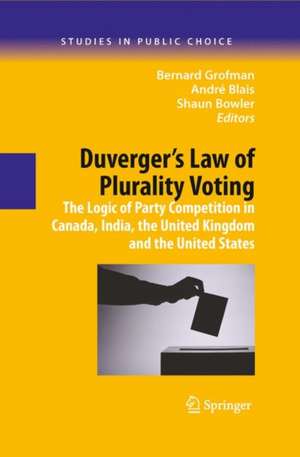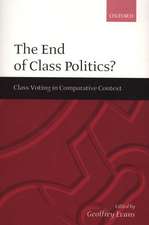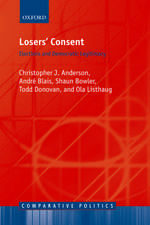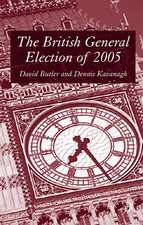Duverger's Law of Plurality Voting: The Logic of Party Competition in Canada, India, the United Kingdom and the United States: Studies in Public Choice, cartea 13
Editat de Bernard Grofman, André Blais, Shaun Bowleren Limba Engleză Hardback – 13 mar 2009
The chapters in this volume consider national-level evidence for the operation of Duverger’s law in the world’s largest, longest-lived and most successful democracies of Britain, Canada, India and the United States. One set of papers involves looking at the overall evidence for Duverger’s Law in these countries; the other set deals with evidence for the mechanical and incentive effects predicted by Duverger. The result is an incisive analysis of electoral and party dynamics.
| Toate formatele și edițiile | Preț | Express |
|---|---|---|
| Paperback (1) | 634.49 lei 6-8 săpt. | |
| Springer – 25 noi 2010 | 634.49 lei 6-8 săpt. | |
| Hardback (1) | 640.71 lei 6-8 săpt. | |
| Springer – 13 mar 2009 | 640.71 lei 6-8 săpt. |
Din seria Studies in Public Choice
-
 Preț: 542.84 lei
Preț: 542.84 lei - 18%
 Preț: 958.38 lei
Preț: 958.38 lei - 20%
 Preț: 579.92 lei
Preț: 579.92 lei - 18%
 Preț: 780.82 lei
Preț: 780.82 lei -
 Preț: 395.09 lei
Preț: 395.09 lei - 5%
 Preț: 370.58 lei
Preț: 370.58 lei -
 Preț: 381.81 lei
Preț: 381.81 lei - 18%
 Preț: 1228.77 lei
Preț: 1228.77 lei - 15%
 Preț: 637.46 lei
Preț: 637.46 lei - 18%
 Preț: 942.63 lei
Preț: 942.63 lei - 15%
 Preț: 633.53 lei
Preț: 633.53 lei - 18%
 Preț: 945.62 lei
Preț: 945.62 lei - 20%
 Preț: 560.55 lei
Preț: 560.55 lei - 18%
 Preț: 947.50 lei
Preț: 947.50 lei - 15%
 Preț: 632.37 lei
Preț: 632.37 lei - 15%
 Preț: 635.15 lei
Preț: 635.15 lei - 15%
 Preț: 634.49 lei
Preț: 634.49 lei - 15%
 Preț: 635.01 lei
Preț: 635.01 lei - 15%
 Preț: 638.89 lei
Preț: 638.89 lei -
 Preț: 381.81 lei
Preț: 381.81 lei - 15%
 Preț: 640.88 lei
Preț: 640.88 lei -
 Preț: 385.62 lei
Preț: 385.62 lei -
 Preț: 393.13 lei
Preț: 393.13 lei - 15%
 Preț: 697.00 lei
Preț: 697.00 lei - 15%
 Preț: 586.70 lei
Preț: 586.70 lei -
 Preț: 389.31 lei
Preț: 389.31 lei - 15%
 Preț: 643.84 lei
Preț: 643.84 lei - 18%
 Preț: 727.00 lei
Preț: 727.00 lei
Preț: 640.71 lei
Preț vechi: 753.77 lei
-15% Nou
Puncte Express: 961
Preț estimativ în valută:
122.62€ • 127.54$ • 101.23£
122.62€ • 127.54$ • 101.23£
Carte tipărită la comandă
Livrare economică 14-28 aprilie
Preluare comenzi: 021 569.72.76
Specificații
ISBN-13: 9780387097190
ISBN-10: 0387097198
Pagini: 165
Ilustrații: VIII, 165 p.
Dimensiuni: 155 x 235 x 11 mm
Greutate: 0.43 kg
Ediția:2009
Editura: Springer
Colecția Springer
Seria Studies in Public Choice
Locul publicării:New York, NY, United States
ISBN-10: 0387097198
Pagini: 165
Ilustrații: VIII, 165 p.
Dimensiuni: 155 x 235 x 11 mm
Greutate: 0.43 kg
Ediția:2009
Editura: Springer
Colecția Springer
Seria Studies in Public Choice
Locul publicării:New York, NY, United States
Public țintă
ResearchCuprins
Introduction: Evidence for Duverger's Law from Four Countries.- Voting Strategically in Canada and Britain.- Neither Representative nor Accountable: First-Past-the-Post in Britain.- Strategic Voting in the US.- Mechanical Effects of Duverger’s Law in the United States.- Canada: The Puzzle of Local Three-Party Competition.- Party Inflation in India: Why Has a Multi-Party Format Prevailed in the National Party System?.- Does the United Kingdom Obey Duverger's Law?.- The United States: A Case of Duvergerian Equilibrium.
Textul de pe ultima copertă
Maurice Duverger is arguably the most distinguished French political scientist of the last century, but his major impact has been largely in the English-speaking world. His book, Political Parties, first translated into English in 1954, has influenced both the party politics literature (which continues to make use of his typology of party organization) and the electoral systems literature. His chief contributions there deal with what have come to be called in his honor Duverger's Law and Duverger's Hypothesis. The first argues that countries with the plurality rule will tend to become two-party systems; the second argues that countries using proportional representation (PR) will tend to become multi-party systems. Duverger also identifies specific mechanisms that will produce these effects, conventionally referred to as "mechanical effects" and "psychological effects."
However, while Duverger's Hypothesis concerning the link between PR and multipartism is now widely accepted, the empirical evidence that plurality voting results in two-party systems is remarkably weak—with the U.S. the most notable exception. The chapters in this volume consider national-level evidence about Duverger's law in the world’s largest, longest-lived and most successful democracies of Britain, Canada, India and the United States. One set of chapters involves looking at the overall evidence for and against Duverger's Law in these countries; the other set deals with evidence about the mechanical and psychological effects predicted by Duverger. The result is an incisive analysis of electoral and party dynamics that will appeal to researchers, academics, students, policymakers, and policy watchers around the world.
Sponsored by the Center for the Study of Democracy, University of California, Irvine
However, while Duverger's Hypothesis concerning the link between PR and multipartism is now widely accepted, the empirical evidence that plurality voting results in two-party systems is remarkably weak—with the U.S. the most notable exception. The chapters in this volume consider national-level evidence about Duverger's law in the world’s largest, longest-lived and most successful democracies of Britain, Canada, India and the United States. One set of chapters involves looking at the overall evidence for and against Duverger's Law in these countries; the other set deals with evidence about the mechanical and psychological effects predicted by Duverger. The result is an incisive analysis of electoral and party dynamics that will appeal to researchers, academics, students, policymakers, and policy watchers around the world.
Sponsored by the Center for the Study of Democracy, University of California, Irvine
Caracteristici
International coverage of the four major examples of plurality voting: U.S., U.K., Canada, India Rigorous comparative analysis, with emphasis on both theoretical and practical implications Prolific editors and expert contributors, well-known to the academic/research communities Includes supplementary material: sn.pub/extras


















